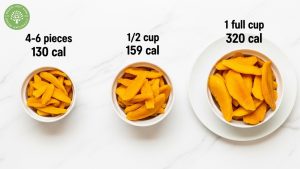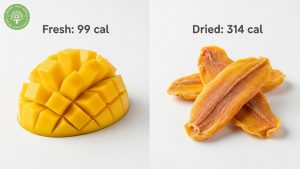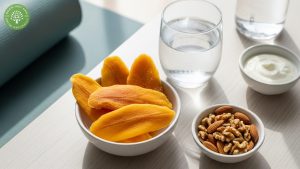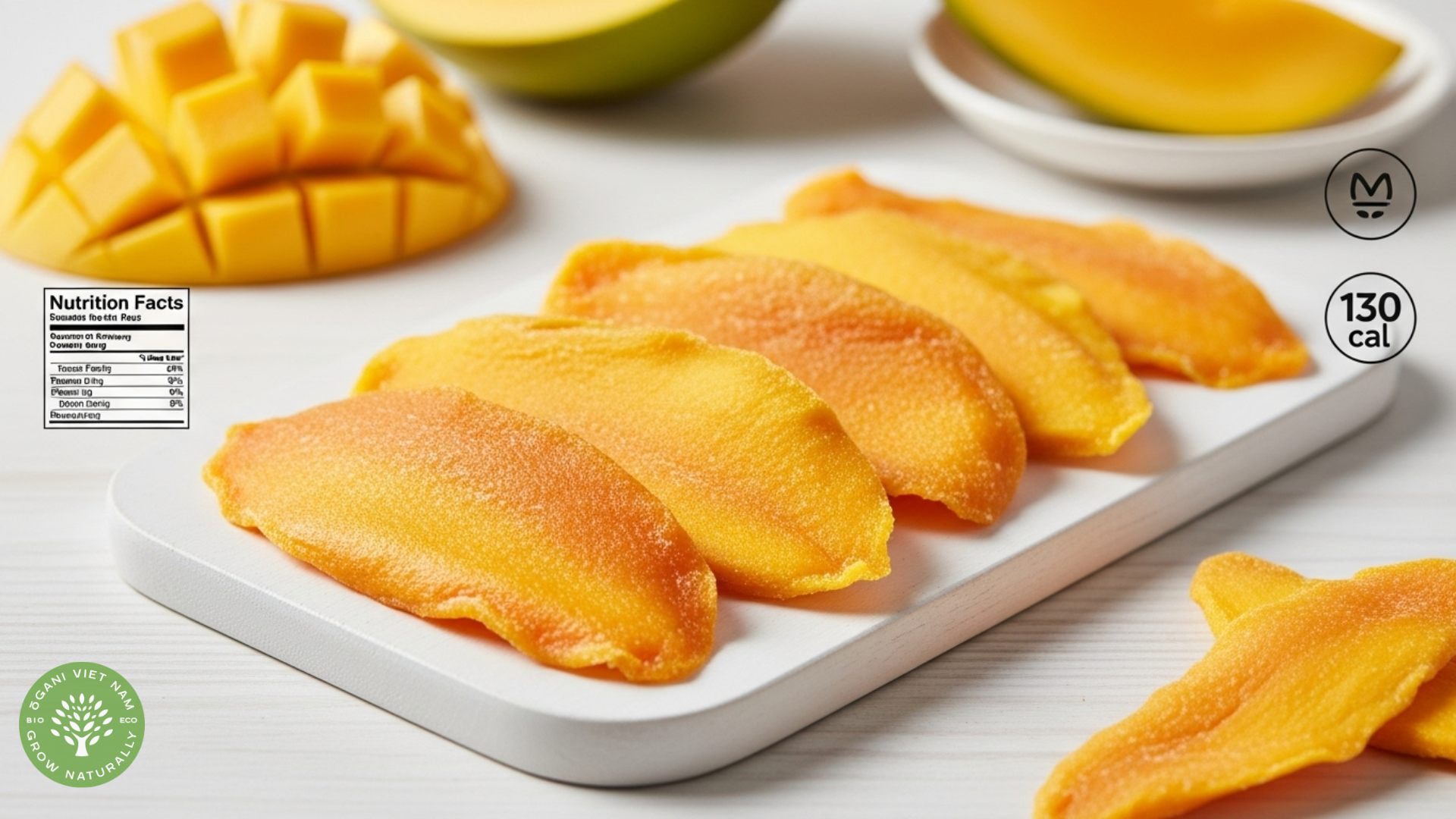Dehydrated mango calories typically range from 128-140 calories per standard serving (about 40-42 grams or 4-6 pieces), making it a concentrated source of energy compared to fresh mango. At Ogani VN, we understand that knowing the exact calorie content helps you make informed snacking decisions, whether you’re managing your weight or simply curious about this tropical treat’s nutritional value.
Understanding dehydrated mango calories per serving

The calorie content in dehydrated mango calories varies significantly based on serving size and preparation method. Most commercial brands contain approximately 314 calories per 100 grams, which translates to roughly 3.1 calories per gram. This concentration occurs because the dehydration process removes water while preserving the fruit’s natural sugars and nutrients.
For practical portion control, here’s what you can expect: a typical snack-size serving of 4-6 pieces (around 40-42 grams) delivers between 128-140 calories. If you’re measuring by volume, half a cup of dried mango pieces contains approximately 159 calories, while a full cup can pack around 320 calories – that’s nearly equivalent to a small meal.
The variation in calorie content also depends on whether the mango is sweetened or unsweetened. Unsweetened organic varieties from brands like Trader Joe’s contain about 130 calories per 40-gram serving, while sweetened versions can jump to 319 calories per 100 grams due to added sugars during processing.
Understanding these numbers becomes crucial when you consider that fresh mango contains only 99 calories per cup. The dehydration process concentrates the fruit’s energy density by approximately 300%, meaning you’ll consume significantly more calories in a smaller volume compared to eating fresh mango.
Dehydrated mango calories vs fresh mango nutrition
Macronutrient breakdown

When comparing dehydrated mango calories to fresh mango, the most striking difference lies in the concentration of nutrients. Dried mango typically contains 81.6 grams of carbohydrates per 100 grams, with about 27 grams being sugar. In contrast, fresh mango has roughly 15 grams of carbohydrates per 100 grams.
The protein content remains relatively modest in both forms – dried mango provides about 1-2.5 grams of protein per 100 grams, while fresh mango offers similar amounts. Fat content stays minimal in both versions, usually less than 1 gram per serving, making dried mango a virtually fat-free snack option.
Fiber content presents an interesting comparison point. While fresh mango provides about 1.6 grams of fiber per 100 grams, dried mango often contains slightly less due to processing methods, typically offering 1-2 grams per standard serving.
Vitamin and mineral retention
The dehydration process affects vitamin content differently across nutrients. Vitamin C, which fresh mango provides abundantly (about 60mg per 100 grams), decreases significantly during drying. Most dried mango products retain only 15-19% of the Daily Value for vitamin C per serving.
However, some nutrients become more concentrated. Vitamin A content often increases on a per-gram basis due to water removal, and minerals like potassium remain largely intact. Iron absorption may actually improve in dried mango, as we’ve observed in our experience helping customers understand these nutritional differences.
The concentration effect means you’re getting more vitamins and minerals per bite, but you’re also consuming more calories and sugar. This trade-off makes portion awareness essential for health-conscious snacking.
Dehydrated mango calories for weight management and health
Calorie density and satiety factors
Dehydrated mango calories present both opportunities and challenges for weight management. The high calorie density means a small handful can provide substantial energy – beneficial for active individuals or those needing quick energy boosts. However, this same characteristic requires careful portion control for weight-conscious consumers.

Research suggests that the chewy texture and concentrated sweetness of dried mango can help satisfy sweet cravings with smaller portions than many processed snacks. The natural fruit sugars provide quick energy, while the fiber content offers some satiety benefits, though less than equivalent calories from fresh fruit.
One practical consideration we share with Ogani VN customers: dried mango lacks the water content that helps create feelings of fullness in fresh fruit. This means it’s easier to overconsume calories without feeling satisfied, potentially leading to unintended weight gain if portions aren’t monitored.
Blood sugar impact and timing
The concentrated sugars in dried mango create a relatively quick blood sugar response compared to fresh fruit. While this isn’t necessarily problematic for most people, those managing diabetes or insulin sensitivity should be aware of portion sizes and timing.
Consuming dried mango with protein or healthy fats can help moderate blood sugar spikes. Many of our customers find success pairing a small portion with nuts or yogurt to create a more balanced snack that provides sustained energy without dramatic glucose fluctuations.
For athletic activities or post-workout recovery, the quick-absorbing sugars in dried mango can actually be beneficial, providing rapid energy replenishment when your body needs it most.
Managing dehydrated mango calories through smart buying
Choosing quality products
When shopping for dried mango to optimize your dehydrated mango calories intake, reading labels becomes crucial. Unsweetened, organic varieties typically offer the best nutritional profile without unnecessary added sugars that increase calorie content significantly.

Look for products listing only “mango” or “organic mango” in ingredients. Avoid varieties with added sugars, sulfur dioxide, or artificial preservatives. These additives not only increase calorie content but may also affect taste and nutritional quality.
Package size matters for portion control. Single-serving packages help prevent overconsumption, though they’re often more expensive per ounce. Bulk purchases require strong self-discipline or pre-portioning into smaller containers at home.
At Ogani VN, we recommend checking the nutrition label for serving size clarity. Some brands list nutrition per piece, others per weight, making direct comparisons challenging without careful label reading.
Storage for optimal freshness
Proper storage maintains both flavor and nutritional quality of your dried mango investment. Store opened packages in airtight containers in cool, dry locations. Refrigeration can extend shelf life, though it may change texture slightly.
Vacuum-sealed packages maintain quality longest, often staying fresh 12-18 months when stored properly. Once opened, consume within 6-12 months for best taste and texture. Signs of spoilage include off odors, mold, or unusually hard texture.
Consider portion control during storage by dividing bulk purchases into single-serving containers immediately after opening. This strategy helps manage dehydrated mango calories intake while maintaining freshness of remaining portions.
Frequently Asked Questions
Q: How many pieces of dried mango equal one fresh mango in calories? A: One medium fresh mango contains about 99 calories. You’d need approximately 3-4 pieces of dried mango (roughly 24-32 grams) to match those calories, but you’d get much less volume and fiber.
Q: Is dried mango good for weight loss? A: Dried mango can fit into weight loss plans when consumed in small portions. The key is treating it as a sweet treat rather than a regular snack, due to its high calorie density of 314 calories per 100 grams.
Q: Can diabetics eat dried mango safely? A: Diabetics should consult healthcare providers about dried mango consumption. The concentrated sugars can affect blood glucose, so small portions paired with protein or consumed post-exercise may be most appropriate.
Q: How does homemade dehydrated mango compare to store-bought versions? A: Homemade versions typically contain fewer calories per piece since they lack added sugars. However, the dehydration process still concentrates natural sugars, so calorie density remains high compared to fresh fruit.
Q: What’s the best time to eat dried mango for weight management? A: Pre or post-workout timing can be ideal, as your body can utilize the quick sugars for energy. Avoid eating dried mango late evening when metabolism naturally slows down.
Making smart choices with dehydrated mango calories
Understanding dehydrated mango calories empowers you to enjoy this tropical treat while maintaining your health goals. With 128-140 calories per typical serving and 314 calories per 100 grams, dried mango offers concentrated nutrition that requires mindful consumption.
At Ogani VN, we believe informed choices lead to better health outcomes. Whether you’re seeking quick energy for workouts, a natural sweet treat, or convenient portable nutrition, dried mango can fit your lifestyle when consumed thoughtfully.
Ready to explore premium quality dried mango options? Visit Ogani VN today to discover our carefully selected range of organic, unsweetened dried fruits that deliver maximum nutrition and flavor in every bite. Your journey toward balanced, delicious nutrition starts with making informed choices about what you eat.
Read more:
- Dehydrated Mango Calories: Complete Nutrition Guide
- Best Dried Mango No Sugar Added: Premium Quality Guide
- Calories In Dried Mango No Sugar Added: Complete Nutrition Guide
- Are Dried Mangoes Good For You? The Complete Health Guide


